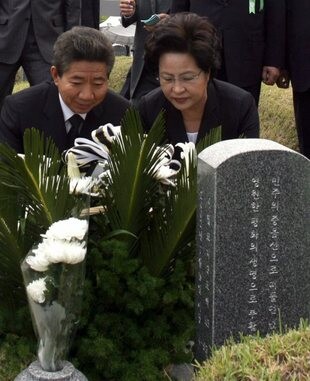hankyoreh
Links to other country sites 다른 나라 사이트 링크
Roh strikes back at critics of his regime

In a speech to mark the 27th anniversary of the May 18 Gwangju Democratic Uprising, President Roh Moo-hyun said, "These days, some people say democratic forces are incompetent or have failed. However, the achievements of the past military governments were made after they unfairly took away the opportunity of others. Democratic forces are newly opening the future of South Korea."
In the speech, given at the May 18 National Cemetery in Gwangju, Roh reiterated, "There are some who express cynical views on history, or slander the history of democracy in Korea; others say democratic forces have failed. I would like to ask them whether their intent is to say that the military dictatorships were competent and successful."
Roh’s remarks came as a backlash to several conservative politicians raising the issue of the ‘incompetence of democratic politicians.’ Specifically, several in and around the conservative opposition Grand National Party (GNP) have recently described as a "lost decade" the 10 years in presidential office of the reformist forces which staged pro-democracy movements against the former military dictatorships. The GNP lawmakers’ and affiliates’ remarks referred specifically to the administrations of former president Kim Dae-jung (1998-2002) and President Roh (2003-present).
The remarks have sparked debate over the achievements of these administrations, and prompted President Roh’s comments in Gwangju on May 18.
"Democratic forces prompted military dictators to step down and clear up unfair and authoritarian cultures. Who could do these things better than democratic forces?" Roh continued in his speech on that day. "Without proper reasons, don’t underestimate the achievements and value of the history made by democratic forces,” Roh said. “While I don’t want to underestimate economic achievements by the past military governments, their achievements were made after snatching the opportunity of others. No one can prove an argument that the achievements were impossible without dictatorship. And such an argument ignores the people’s competence,” Roh said.
"Regionalism still remains in our politics, and there is a sign of returning to regionalism," Roh said, referring to the fact that the most Korean political parties have taken advantage of long-standing, deep-seated rivalry between the nation’s eastern and western regions. The pro-government Uri Party, founded by Roh and his former colleagues, has its base in the nation’s west, with the main opposition GNP holding support from the east.
"If this trend continues, it could lead to a politics of corruption: without overcoming regionalism, it will be difficult to see high-quality politics that serve the people," Roh continued.
Responding to Roh’s remarks, Rep. Na Gyeong-won, a spokeswoman at the main opposition Grand National Party, told the press following the president’s speech, "We did not say democratic forces are incompetent, but rather left-wing forces. It’s typical sophistry from President Roh Moo-hyun, by putting democratic forces on equal footing with the left-wing forces who have failed the nation."
Some of the debate is grounded in figures, as Korea saw annual economic growth of 8-9 percent on average in the 1970s and 1980s when the military dictators, Park Chung-hui and Chun Doo-hwan, consolidated power, compared to Korea under democracy, with an average 5-6 percent growth in the 1990s and 3-4 percent growth after the 1997 Asian financial crisis.
Please direct questions or comments to [englishhani@hani.co.kr]
Editorial・opinion
![[Column] Park Geun-hye déjà vu in Yoon Suk-yeol [Column] Park Geun-hye déjà vu in Yoon Suk-yeol](https://flexible.img.hani.co.kr/flexible/normal/500/300/imgdb/original/2024/0424/651713945113788.jpg) [Column] Park Geun-hye déjà vu in Yoon Suk-yeol
[Column] Park Geun-hye déjà vu in Yoon Suk-yeol![[Editorial] New weight of N. Korea’s nuclear threats makes dialogue all the more urgent [Editorial] New weight of N. Korea’s nuclear threats makes dialogue all the more urgent](https://flexible.img.hani.co.kr/flexible/normal/500/300/imgdb/original/2024/0424/7317139454662664.jpg) [Editorial] New weight of N. Korea’s nuclear threats makes dialogue all the more urgent
[Editorial] New weight of N. Korea’s nuclear threats makes dialogue all the more urgent- [Guest essay] The real reason Korea’s new right wants to dub Rhee a founding father
- [Column] ‘Choson’: Is it time we start referring to N. Korea in its own terms?
- [Editorial] Japan’s rewriting of history with Korea has gone too far
- [Column] The president’s questionable capacity for dialogue
- [Column] Are chaebol firms just pizza pies for families to divvy up as they please?
- [Column] Has Korea, too, crossed the Rubicon on China?
- [Correspondent’s column] In Japan’s alliance with US, echoes of its past alliances with UK
- [Editorial] Does Yoon think the Korean public is wrong?
Most viewed articles
- 1‘We must say no’: Seoul defense chief on Korean, USFK involvement in hypothetical Taiwan crisis
- 2N. Korean delegation’s trip to Iran shows how Pyongyang is leveraging ties with Moscow
- 346% of cases of violence against women in Korea perpetrated by intimate partner, study finds
- 4[Column] Park Geun-hye déjà vu in Yoon Suk-yeol
- 5‘Weddingflation’ breaks the bank for Korean couples-to-be
- 6Will NewJeans end up collateral damage in internal feud at K-pop juggernaut Hybe?
- 7Amnesty notes ‘erosion’ of freedom of expression in Korea in annual human rights report
- 8[Interview] Dear Korean men, It’s OK to admit you’re not always strong
- 9Korean government’s compromise plan for medical reform swiftly rejected by doctors
- 10[Editorial] Japan’s rewriting of history with Korea has gone too far